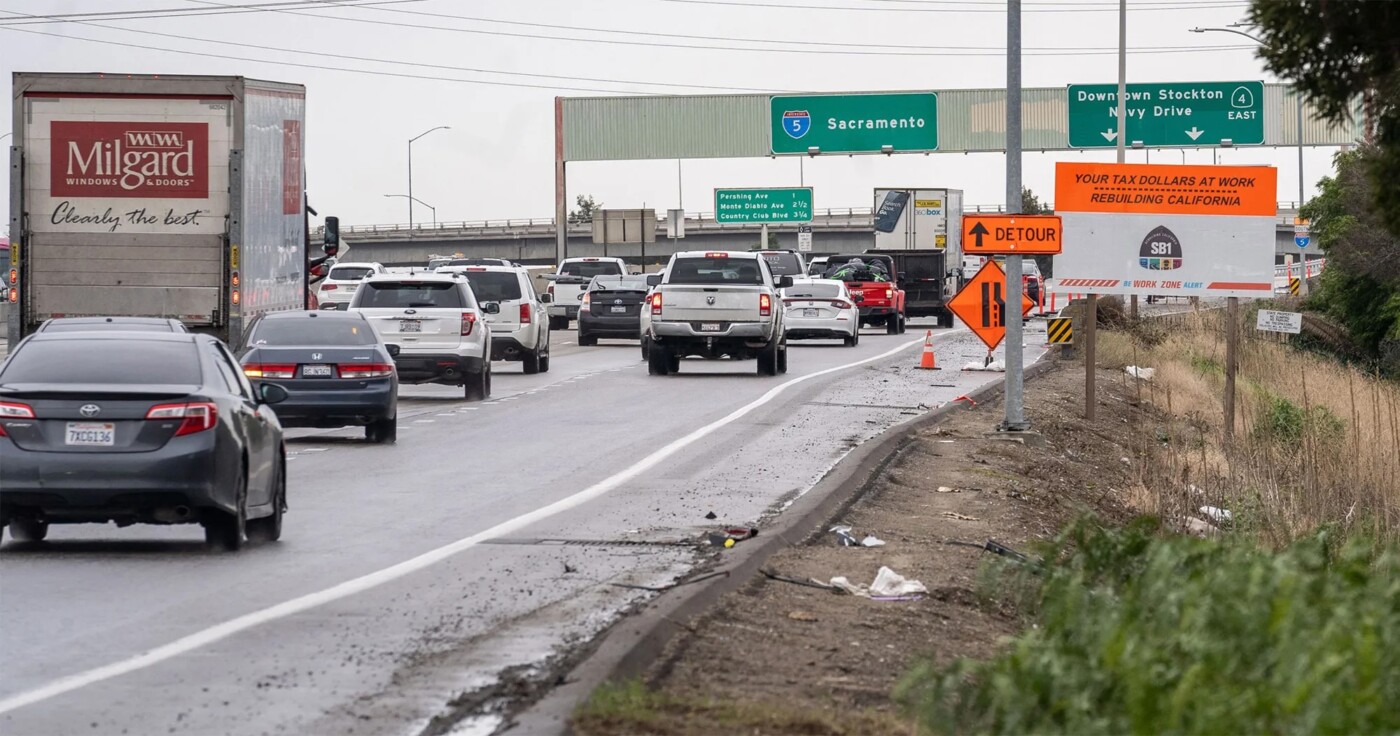A dozen highway construction workers and a state assemblymember gathered Wednesday off Interstate 80 in Davis to advocate for a bill that would install automated license plate readers to help catch speeding drivers in construction sites.
State Assemblymember Matt Haney, D-San Francisco, is pushing for the passage of Assembly Bill 289, or the state highway work zone speed safety program. If passed by the Legislature and signed by the governor, up to 75 automated license plate readers would be set up at highway construction sites across the state to catch speeding drivers and issue tickets.
“Right now, enforcement in these zones is limited,” Haney said at Wednesday’s news conference. “Our partners at the California Highway Patrol do historic, heroic work, but they can’t be everywhere.”
The primary goal of the legislation is to help protect workers in highway construction zones. These workers have one of the most dangerous jobs since they sometimes work close to cars driving at freeway speeds, according to the federal Bureau of Labor Statistics.
“We make sure that the people who keep California moving, the highway construction and maintenance workers, whose labor makes our roads safer, economy stronger and our daily lives possible, are kept safe themselves,” Haney said. “They build our bridges. They repave our roads. They work in extreme heat and sometimes in the dead of night, often with nothing but a few feet separating them from oncoming traffic.”
Thousands of crashes annually
In 2021 alone, California saw more than 9,000 crashes in highway construction zones, resulting in nearly 3,000 injuries and 73 fatalities including both construction workers and car occupants, according to Caltrans.
Since 1921, 194 Caltrans workers have been killed on the job. Many of those deaths were the result of being struck by dangerous drivers.
Implementing automated speed enforcement at highway construction sites, Haney said, will help deter unsafe behavior of drivers in work zones.
Similar legislation has already been passed in 16 states, Haney said.
“Automated speed enforcement works. It slows people down, and a few extra seconds of reaction time can mean the difference between life and death.”
Ricardo Alarcon, highway construction worker
After starting its automated work zone speed enforcement program in 2020, Pennsylvania saw a 19% reduction in work zone crashes, according to the Pennsylvania Department of Transportation.
“Automated speed enforcement works,” said highway construction worker Ricardo Alarcon in a speech at Wednesday’s news conference. “It slows people down, and a few extra seconds of reaction time can mean the difference between life and death.”
If the legislation is passed, drivers caught by the cameras will be fined $50 if they are recorded speeding 11 to 15 mph over the limit, $100 for driving 16 to 25 mph over the limit, $200 for driving 26 mph or more over the limit, and $500 for drivers recorded traveling at a speed of 100 mph or greater.
However, people with incomes below the federal poverty level may be eligible for fine reductions.
Fine discounts for low-income violators
“This bill includes important reductions in the amount of fines that anyone would have to pay based on their income,” Haney said. “Low-income Californians, those who may receive public benefits can have up to a 50% discount, or even up to 80% in some cases, on any fines.”
The bill has passed in three Assembly committees with bipartisan support and now heads to the Assembly floor.
If the bill reaches Gov. Gavin Newsom’s desk and is signed into law, it would go into effect in January of next year. Installation of all speed enforcement detectors will take a few months, and drivers caught speeding by license plate cameras in construction zones where workers are present would be given warnings in the first 60 days of the program.
For highway construction workers like Alarcon, the bill is a necessary protection for one of the most dangerous jobs in the country.
“In my line of work, there’s always a risk,” Alarcon said. “You never know if today is the day you will make it home to your loved ones. AB 289 gives us a real chance to make our job site safer for us and for drivers.”
The post Bill seeks automated license plate cameras to improve safety in road construction zones appeared first on Local News Matters.
